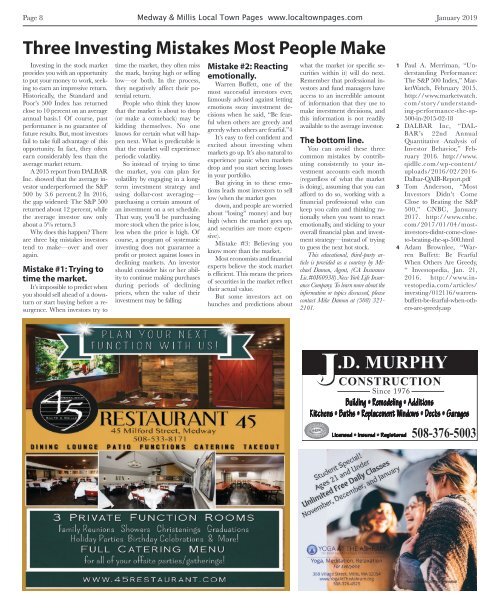You also want an ePaper? Increase the reach of your titles
YUMPU automatically turns print PDFs into web optimized ePapers that Google loves.
Page 8 <strong>Medway</strong> & <strong>Millis</strong> Local Town Pages www.localtownpages.com <strong>January</strong> <strong>2019</strong><br />
Three Investing Mistakes Most People Make<br />
Investing in the stock market<br />
provides you with an opportunity<br />
to put your money to work, seeking<br />
to earn an impressive return.<br />
Historically, the Standard and<br />
Poor’s 500 Index has returned<br />
close to 10 percent on an average<br />
annual basis.1 Of course, past<br />
performance is no guarantee of<br />
future results. But, most investors<br />
fail to take full advantage of this<br />
opportunity. In fact, they often<br />
earn considerably less than the<br />
average market return.<br />
A 2015 report from DALBAR<br />
Inc. showed that the average investor<br />
underperformed the S&P<br />
500 by 3.6 percent.2 In 2016,<br />
the gap widened: The S&P 500<br />
returned about 12 percent, while<br />
the average investor saw only<br />
about a 5% return.3<br />
Why does this happen? There<br />
are three big mistakes investors<br />
tend to make—over and over<br />
again.<br />
Mistake #1: Trying to<br />
time the market.<br />
It’s impossible to predict when<br />
you should sell ahead of a downturn<br />
or start buying before a resurgence.<br />
When investors try to<br />
time the market, they often miss<br />
the mark, buying high or selling<br />
low—or both. In the process,<br />
they negatively affect their potential<br />
return.<br />
People who think they know<br />
that the market is about to drop<br />
(or make a comeback) may be<br />
kidding themselves. No one<br />
knows for certain what will happen<br />
next. What is predictable is<br />
that the market will experience<br />
periodic volatility.<br />
So instead of trying to time<br />
the market, you can plan for<br />
volatility by engaging in a longterm<br />
investment strategy and<br />
using dollar-cost averaging—<br />
purchasing a certain amount of<br />
an investment on a set schedule.<br />
That way, you’ll be purchasing<br />
more stock when the price is low,<br />
less when the price is high. Of<br />
course, a program of systematic<br />
investing does not guarantee a<br />
profit or protect against losses in<br />
declining markets. An investor<br />
should consider his or her ability<br />
to continue making purchases<br />
during periods of declining<br />
prices, when the value of their<br />
investment may be falling.<br />
Mistake #2: Reacting<br />
emotionally.<br />
Warren Buffett, one of the<br />
most successful investors ever,<br />
famously advised against letting<br />
emotions sway investment decisions<br />
when he said, “Be fearful<br />
when others are greedy and<br />
greedy when others are fearful.”4<br />
It’s easy to feel confident and<br />
excited about investing when<br />
markets go up. It’s also natural to<br />
experience panic when markets<br />
drop and you start seeing losses<br />
in your portfolio.<br />
But giving in to these emotions<br />
leads most investors to sell<br />
low (when the market goes<br />
down, and people are worried<br />
about “losing” money) and buy<br />
high (when the market goes up,<br />
and securities are more expensive).<br />
Mistake #3: Believing you<br />
know more than the market.<br />
Most economists and financial<br />
experts believe the stock market<br />
is efficient. This means the prices<br />
of securities in the market reflect<br />
their actual value.<br />
But some investors act on<br />
hunches and predictions about<br />
what the market (or specific securities<br />
within it) will do next.<br />
Remember that professional investors<br />
and fund managers have<br />
access to an incredible amount<br />
of information that they use to<br />
make investment decisions, and<br />
this information is not readily<br />
available to the average investor.<br />
The bottom line.<br />
You can avoid these three<br />
common mistakes by contributing<br />
consistently to your investment<br />
accounts each month<br />
(regardless of what the market<br />
is doing), assuming that you can<br />
afford to do so, working with a<br />
financial professional who can<br />
keep you calm and thinking rationally<br />
when you want to react<br />
emotionally, and sticking to your<br />
overall financial plan and investment<br />
strategy—instead of trying<br />
to guess the next hot stock.<br />
This educational, third-party article<br />
is provided as a courtesy by Michael<br />
Damon, Agent, (CA Insurance<br />
Lic.#0I60938) New York Life Insurance<br />
Company. To learn more about the<br />
information or topics discussed, please<br />
contact Mike Damon at (508) 321-<br />
2101.<br />
1 Paul A. Merriman, “Understanding<br />
Performance:<br />
The S&P 500 Index,” MarketWatch,<br />
February 2015.<br />
http://www.marketwatch.<br />
com/story/understand-<br />
ing-performance-the-sp-<br />
500-in-2015-02-18<br />
2 DALBAR Inc, “DAL-<br />
BAR’s 22nd Annual<br />
Quantitative Analysis of<br />
Investor Behavior,” February<br />
2016. http://www.<br />
qidllc.com/wp-content/<br />
uploads/2016/02/2016-<br />
Dalbar-QAIB-Report.pdf<br />
3 Tom Anderson, “Most<br />
Investors Didn’t Come<br />
Close to Beating the S&P<br />
500,” CNBC, <strong>January</strong><br />
2017. http://www.cnbc.<br />
com/2017/01/04/mostinvestors-didnt-come-closeto-beating-the-sp-500.html<br />
4 Adam Brownlee, “Warren<br />
Buffett: Be Fearful<br />
When Others Are Greedy,<br />
“ Investopedia, Jan. 21,<br />
2016. http://www.investopedia.com/articles/<br />
investing/012116/warrenbuffett-be-fearful-when-others-are-greedy.asp<br />
.D. MURPHY<br />
JCONSTRUCTION<br />
Since 1976<br />
Building • Remodeling • Additions<br />
Kitchens • Baths • Replacement Windows • Decks • Garages<br />
Licensed • Insured • Registered 508-376-5003

















